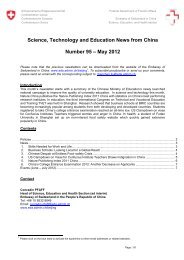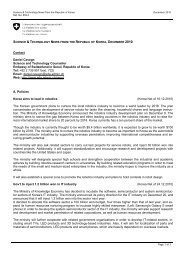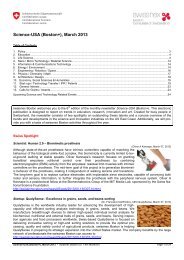Science-USA (Boston+) - swissnex Boston
Science-USA (Boston+) - swissnex Boston
Science-USA (Boston+) - swissnex Boston
You also want an ePaper? Increase the reach of your titles
YUMPU automatically turns print PDFs into web optimized ePapers that Google loves.
Schweizerische Eidgenossenschaft<br />
Confédération suisse<br />
Confederazione Svizzera<br />
Confederaziun svizra<br />
9. Architecture / Design<br />
Big success for NASA shirt fashion<br />
(The <strong>Boston</strong> Globe, October 31, 2012)<br />
Ministry of Supply broke records to become the most successful fashion project to date on Kickstarter.<br />
Three MIT graduate students discovered that the last innovation in men’s shirt was 30 years<br />
ago and designed their Apollo shirt. Selling for $105, the shirts are designed from a proprietary fabric<br />
the same that NASA uses in space suits to control heat absorption and heat loss to make the<br />
wearer more comfortable. On top of regulating temperature, the fabric (which currently has six patents<br />
pending) is designed to fit better. It has stretch so it can fit closer to the body.<br />
http://swissinnovation.org/newsUS/web/2012/11-121031-43.html<br />
10. Economy, Social <strong>Science</strong>s & Humanities<br />
Aging baby boomers affect future transportation planning<br />
(The <strong>Boston</strong> Globe, November 09, 2012)<br />
The Baby boomers , those 74 million people born between 1946 and 1964 have been the major driver of overall<br />
growth in travel in the United States and that has had a tremendous impact over the past 40 years in how we have<br />
approached transportation planning. As a result of changes over the last four decades, driven in part by baby<br />
boomers, the number of vehicles in the US has nearly tripled, the report said. Now that boomers are beginning to<br />
move into a new phase of life, their travel patterns and needs are expected to change as well.<br />
http://swissinnovation.org/newsUS/web/2012/10-121109-44.html<br />
Systematic approach to help the poor<br />
(The <strong>Boston</strong> Globe, November 22, 2012)<br />
Billions of dollars are spent each year on efforts to alleviate poverty in the developing world. Yet there have been<br />
remarkably few systematic attempts to examine what actually works. To improve the success rate, three MIT professors<br />
founded the Abdul Latif Jameel Poverty Action Lab. Since 2003, its researchers have used randomized trials<br />
to figure out which interventions help the poor the most. They identified small, inexpensive ways to alter human<br />
behavior to produce dramatic, positive results. As for exaplme: Giving mothers in India a bag of dried beans when<br />
they bring their children in for immunizations doubles the rate of children who get all their shots. It is a testament to<br />
the lab’s usefulness that the World Bank has instituted randomized trials of its own.<br />
http://swissinnovation.org/newsUS/web/2012/10-121122-7b.html<br />
11. Start-ups / Technology Transfer / IPR / Patents<br />
Harvard i-lab created startups<br />
(The <strong>Boston</strong> Globe, November 06, 2012)<br />
Start-up Vaxess Technologies was founded by four Harvard University students from different<br />
corners of the school’s vast campus who met only when each checked out a class at the<br />
university’s new Innovation Lab. The i-lab is an extension of the classroom where students<br />
get to grow and learn, it serves the entire university, to bring everyone together in one place<br />
and encourage collaboration. The founder of Vaxess regularly used the i-lab to develop a<br />
business around a new technology to stabilize vaccines so they don’t need to be refrigerated<br />
during delivery. They have regularly used the i-lab to develop the business, taking in workshops and talks from visiting<br />
entrepreneurs, even using it as a base from which to raise money.<br />
http://swissinnovation.org/newsUS/web/2012/11-121106-b6.html<br />
Civic-minded start-ups<br />
(The <strong>Boston</strong> Globe, November 12, 2012)<br />
Call it democracy a la carte: A new breed of civic-minded start-ups wants to let citizens decide directly what improvements<br />
they want in their neighborhoods, from new dog parks to park repairs, and allow them to donate toward<br />
the cost. Using the crowdfunding money-raising model popularized in the tech start-up world, these initiatives allow<br />
people to pool donations of time and money for civic projects of their choosing, rather than wait for the work to be<br />
done by public employees or not done at all.<br />
http://swissinnovation.org/newsUS/web/2012/11-121112-3e.html<br />
<strong>Science</strong>-<strong>USA</strong> (<strong><strong>Boston</strong>+</strong>), November 2012 • <strong>swissnex</strong> <strong>Boston</strong> (Dr. Felix Moesner / Sabina Tresch) Page 10 of 12






